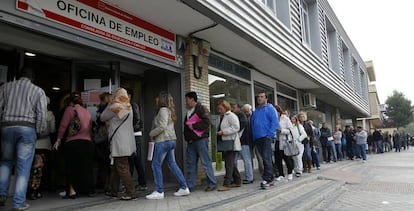Brussels warns Spain about rising inequality and social exclusion
EC praises economic progress, but notes this does not automatically result in better societal indicators
Spain is maintaining its strong economic recovery after implementing ambitious reforms, and has shored up its banking sector and reduced unemployment levels. But “the legacy of the crisis is not yet fully overcome, and significant challenges persist,” says the European Commission’s Spain 2017 Report, released on Wednesday.

The report, which EL PAÍS has seen, underscores the unquestionable progress made by the Spanish economy in the last three years, but warns that this is not automatically reflected in improved social indicators. Economic achievements have resulted in minimal drops in poverty and social exclusion rates, says the study.
The levels of inequality, poverty and social exclusion in Spain are “among the highest in the EU.” The conclusions mirror similar studies by other international observers.
The risk of slipping into poverty is far above the levels that Rajoy found after he won the 2011 election
Brussels is also worried about the Spanish job market, which despite major reforms, still shows persistently high levels of temporary employment. According to the report, 13.1% of Spanish workers are at risk of slipping into poverty.
Inequality was already an issue before the crisis, and it continues to be so now. “The gap between the wealthiest 20% and the poorest 20% is one of the biggest in the Union, and it continues to rise,” reads the report.
The Gini index, a major indicator of inequality that measures wealth distribution, is also “among the highest in the Union” both before and after factoring in the redistribution effects of taxes and cash transfers such as unemployment checks and other benefits.

The Commission even notes that there has been a rise in unequal access to health services.
The risk of slipping into poverty is far above the levels that Prime Minister Rajoy found when he first took office after his conservative Popular Party won the November 2011 election. This is particularly true of children and people of working age: Brussels warns that even individuals who have jobs are at risk of falling into poverty.
The reasons offered by Brussels range from “limited” social benefits compared with other countries, “a lack of coordination” between employment services and social services, low levels of state support for families by EU standards, and above all, very high levels of temporary employment.
The high rate of temporary contracts, 27% (only outdone by Greece) has negative social consequences, undermines productivity growth and has negative fiscal implications, warns the report.
English version by Susana Urra.
Tu suscripción se está usando en otro dispositivo
¿Quieres añadir otro usuario a tu suscripción?
Si continúas leyendo en este dispositivo, no se podrá leer en el otro.
FlechaTu suscripción se está usando en otro dispositivo y solo puedes acceder a EL PAÍS desde un dispositivo a la vez.
Si quieres compartir tu cuenta, cambia tu suscripción a la modalidad Premium, así podrás añadir otro usuario. Cada uno accederá con su propia cuenta de email, lo que os permitirá personalizar vuestra experiencia en EL PAÍS.
¿Tienes una suscripción de empresa? Accede aquí para contratar más cuentas.
En el caso de no saber quién está usando tu cuenta, te recomendamos cambiar tu contraseña aquí.
Si decides continuar compartiendo tu cuenta, este mensaje se mostrará en tu dispositivo y en el de la otra persona que está usando tu cuenta de forma indefinida, afectando a tu experiencia de lectura. Puedes consultar aquí los términos y condiciones de la suscripción digital.









































